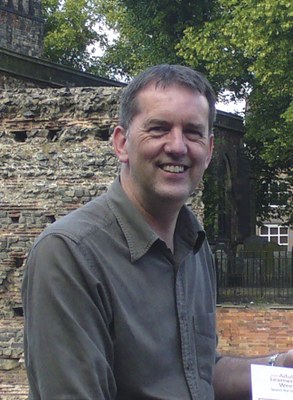Clive Marsh
Professor Clive Marsh
BA, MEd, DPhil, PFHEA
I am Head of the Vaughan Centre for Lifelong Learning during the 'teach-out' period through to Summer 2020. I am qualified both in theology and education and continue to ply my trade as a scholar of religious and theological studies within the BA Humanities and Arts. There is (genuinely!) little that is more exciting than wrestling, on a cold December evening (though in a warm room, on main campus), with the practical and intellectual challenges of exploring the meaning of life.
For the record, I studied in Bangor, Chicago, Tübingen, Oxford, and the Open University and have been teaching in adult education for nearly thirty years, moving between university and church appointments throughout that time. My main area of expertise - the reason I get invited from outside Leicester to do things - is the field of theology and culture, especially with respect to popular culture and the arts. I explore how theological ideas and beliefs are carried, and how people make meaning with what is available to them - whether or not they call themselves religious. I am then especially interested in what this all means for contemporary Christian theology in the West.
I have examined and assessed new programmes for lots of institutions (Hull, Durham, Winchester, Chichester, Oxford, Edinburgh, St Andrews, Sheffield, City University London and Liverpool Hope) and have lectured on my areas of specialism in Austria, Belgium, Finland, Germany, Korea, Sweden, Turkey and the US.
As well as continuing in my part-time role in Leicester during the ‘teach-out’, I am an International Research Consultant at the Queen's Foundation for Ecumenical Theological Education, Birmingham, UK, am Chair of the UK-based Network for Theology, Religion and Popular Culture (next conference: Kent, July 2019) and am a member of the American Academy of Religion (AAR) and the Society for the Study of Theology (SST). My next book will be A Cultural Theology of Salvation, due out from Oxford University Press in 2018.
The Theology, Religion and Popular Culture Network was founded in 2005 at the initiative of Professors Gordon Lynch and Peter Ward. It was recognised that there was a need for some serious, rigorous academic engagement within the field of interaction between religion and popular culture which, whilst undertaken on an academic footing, also recognised the challenges brought to and by popular culture’s presence in faith communities. The appearance of the word ‘theology’ in the Network’s title signalled that practitioners as well as academics were involved.
In similar ways to the manner in which discussions were happening in cultural studies about how (indeed whether) scholars could also be fans, and fans of what they were allegedly critically and dispassionately studying, it was acknowledged that those studying popular culture and religion might be fans of both popular culture and religion. They might also be critical of neither. At the same time, it could not be assumed that no interests were being served in the work of scholars professing no religious commitments.
It was, then, a live issue to enable exploration of commitment/s (to religion and/or popular culture) in a critically rigorous, academically-satisfying way, in a way which may benefit faith communities and wider society. A new forum needed to be found for this. TRPCN was born.
The Network therefore exists to broker the best of research into popular culture and faith/ religion/ theology to faith communities, and to encourage rigorous academic reflection (for those of all faiths and none) on issues which arise in society at the interface between popular cultures, theologies and religions.
The Network enables people from a variety of disciplines – not just religious studies, theology and sociology, but also sport and cultural studies, psychology, anthropology, media studies – anyone who has an interest in what goes on at the contemporary interface between religion and popular culture, to examine what is happening in society today.
The Network had largely, though not exclusively, Christian roots when it first emerged. It clearly could not stay that way, though it has proved a slow process to become more religiously diverse. Nor could it be confined to an interplay between religious studies and sociology, though as anyone who works in inter-disciplinary fields knows, it is hard to foster wide networks simply because different disciplines speak different languages and have different methods. But the Network is committed to enabling as wide a conversation as is possible to take place.
